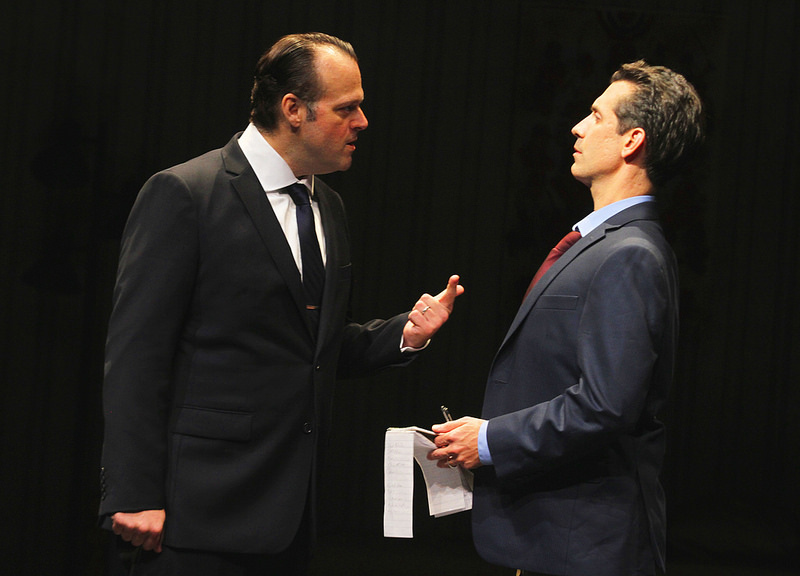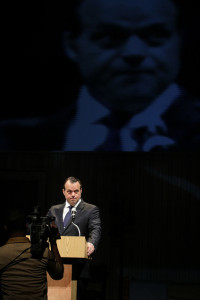
Last season, Theatre Exile had its best-selling show ever with Bruce Graham’s play about controversial Philadelphia mayor Frank Rizzo (Scott Greer). In a relaunched production by Philadelphia Theatre Company with much of the same artistic team, it’s easy to see why RIZZO (play and character) appealed to Philadelphia audiences, even if the work displays pitfalls common to biographical drama.
Having missed the Exile version, I can’t judge what was lost or gained when the smaller production transferred to a larger stage, except to say the set (two facing classic Philly row houses, designer Colin McIlvaine), lighting (by Mike Inwood with huge video projections by Christopher Ash), and blocking (director Joe Canuso) make full use of the space. And that the expansive life story of a larger-than-life character, based on the compelling biography Rizzo: The Last Big Man in Big City America by Sal Paolantonio, seems ideally suited to an expansive production.
It the expansive attempt at storytelling which discouraged me from fighting for a ticket to last year’s production. Graham frames his story around an episode during Rizzo’s final (of five, two successful; two not) mayoral candidacies, but most of the play is told through flashbacks to key moments in the policeman-turned-politician’s life, biographical explanations by a narrator-reporter (Damon Bonetti), and dramatized interview responses by friends, opponents, and representative citizens (Robert Daponte, Paul L.Nolan, William Rahill, Amanda Schoonover, and Steven Wright play various roles; all but Wright return from the Exile production).

Hollywood loves these sort of productions. Gandhi, Ali, Nixon, Piaf, Johnny Cash, Ray Charles: all have seen adaptors try to fashion decades of complicated life into a neat two-hour drama. The results please crowds and award boards but rarely display much dramatic merit. (If the format wouldn’t be good with a fictional character, then…) The best biographical works take an episode from an historical figure’s life—Che’s drive across the Andes, Hitler’s final days in the bunker—and use it as the basis of a satisfying narrative which nonetheless reveals the essential character traits of its subject.
For Rizzo, these traits include racism implicit (“those people”) and explicit (“vote white”), bullying (suppressing journalists, intimidating opponents), and brutality (spacco il capo, or “break their heads”, style of policing). These all come through unhidden in Graham’s script, but the playwright also captures the mayor’s charismatic affability, sympathy for and connection with working-class South Philadelphians, and love for his city.
Greer navigates this complicated character with aplomb. He is as convincing in politicking as barely contained anger; you can’t take your eyes off his Rizzo.
The real life mayor was equally fascinating, and his racism, populist demagoguery, aggressive policing, and contempt for the press are especially relevant in this political climate. “Make Philadelphia great again,” the character says, in a line clearly been adapted for the PTC production. Reading Paolantonio’s biography, one gets the sense of a writer who disagrees with but can’t help but like his subject.
Whatever you think of Rizzo—opinion is still divided—the likeability of a character has little bearing on the potential of the biographical story (Downfall is a better movie than Passion of the Christ). Graham’s play should appeal to any Philadelphian who remembers Rizzo’s looming presence over the city’s politics, and it serves as an intriguing history lesson. (I found myself wanting to revisit Paolantonio’s text.) But much of the work plays out as documentary; Sam Katz’s Philadelphia Experiment history series dedicated an entire episode to Rizzo’s reign, and many scenes would be fitting as historical reenactment in that series.
Without a narrative thrust, it’s hard to imagine the play proving compelling to non-Philadelphians. Buteven if RIZZO is poor narrative theater, it’s great documentary theater.
[Suzanne Roberts Theatre, 480 S. Broad Street] September 23-October 23, 2016; http://philadelphiatheatrecompany.org/shows/rizzo.
